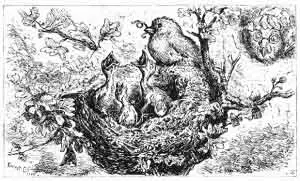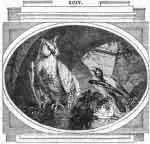A lazy Cuckoo let a Hedge-sparrow hatch and rear her young and then complained to an Owl when the young flew off without acknowledging the Cuckoo.
Do not expect from others that which you cannot give in return.

JBR Collection
A lazy Cuckoo, too idle to make a comfortable home for herself and offspring, laid her eggs in the nest built by the Hedge-sparrow, who, taking the charge wholly on herself, hatched them, and bred up the young with maternal attention, till such time as they were enabled to provide for themselves, when they took wing and fled. Upon this the worthless Cuckoo came gossiping to the Owl, complaining of the misconduct of the Hedge-sparrow in treating her with so little attention, in return for the confidence she had shown in entrusting her with the care of her precious young brood. “Would you believe it?” continued the Cuckoo. “The ungrateful birds have flown off without paying me any of those duties which are the natural right of a mother from her offspring!” “Peace, peace,” replied the sage Owl, “nor expect that from others which you cannot give in return. The obligation lies wholly on your side to the charitable Hedge-sparrow, for her benevolence to your helpless young, whom you had abandoned; and remember this, that before you teach gratitude to others, you should learn yourself to be grateful.”

Northcote
[Note: The Northcote fable is the same fable as in the JBR Collection above. Only the illustrations and Application associated with the fable in the Northcote book are displayed here.]
Application
Ingratitude is of all crimes that which we account the most venial in ourselves, and the most unpardonable in others.
Nothing in the world is so common as complaints of the want of gratitude, too often arising from our overrating the value of the obligations we may have bestowed on others; the account we keep of the matter is generaliy made out much in our own favour, and the articles commonly rated too high; and these are also engraved on our memories in deep characters. We seldom give ourselves the trouble to examine with a scrutinizing and impartial eye into our own conduct, the items to be brought against us are marked but faintly in our minds, and by making at first but a very slight impression, are soon totally obliterated and forgotten. Favours done to ourselves our vanity frequently makes us receive as our due, but those we bestow on others, appear to us as acta of sheer bounty alone.
Another point in this Fable alludes to the conduct of children to parents. It is natural to suppose, that where little attention has been bestowed by parents, little return of duty will be given by children.
It has been well observed of families reared in indigence, that they are often rich in reciprocal affection: the reason is, that affluence gives to hirelings those tender offices which endear parents, children, brothers, and sisters to each other. J. N.


